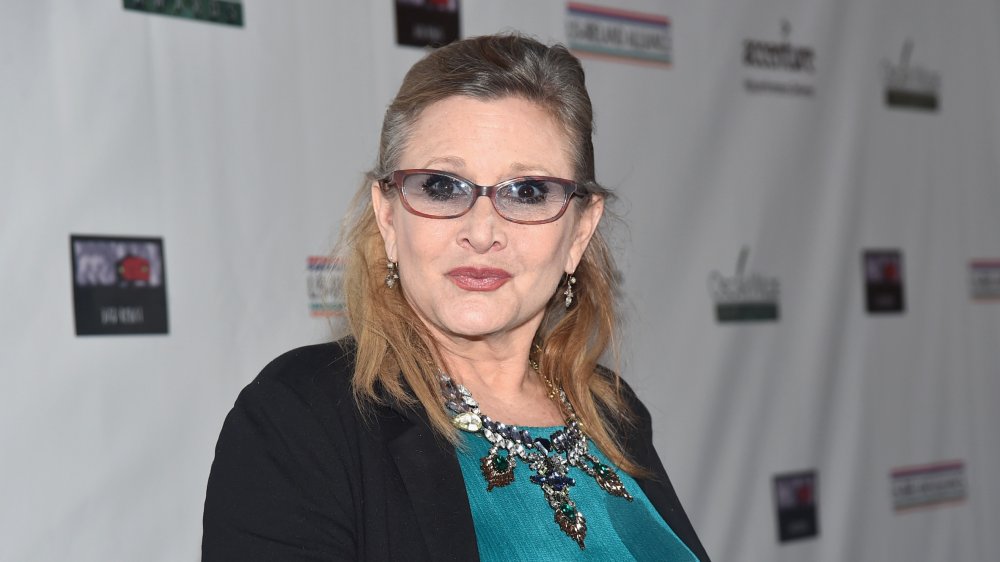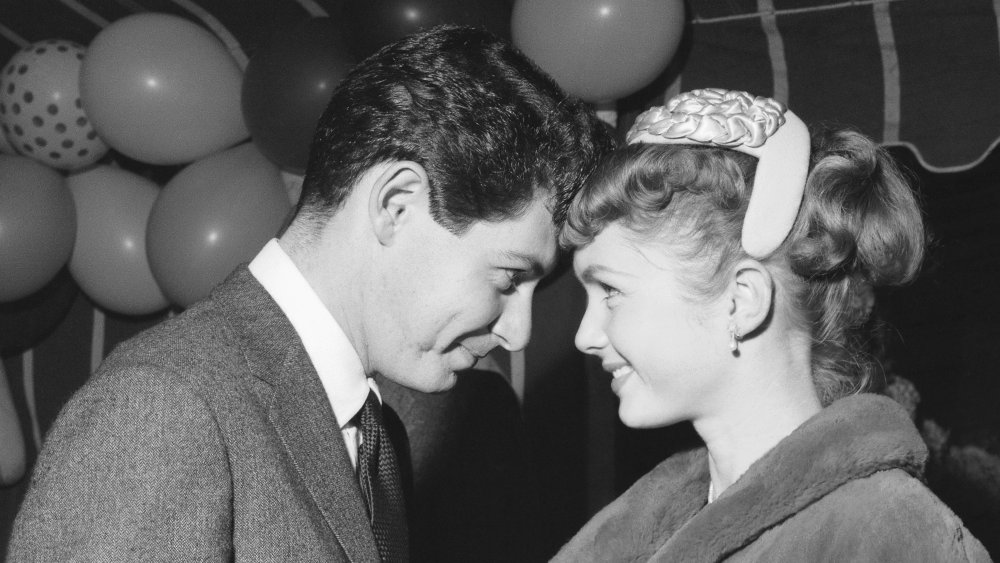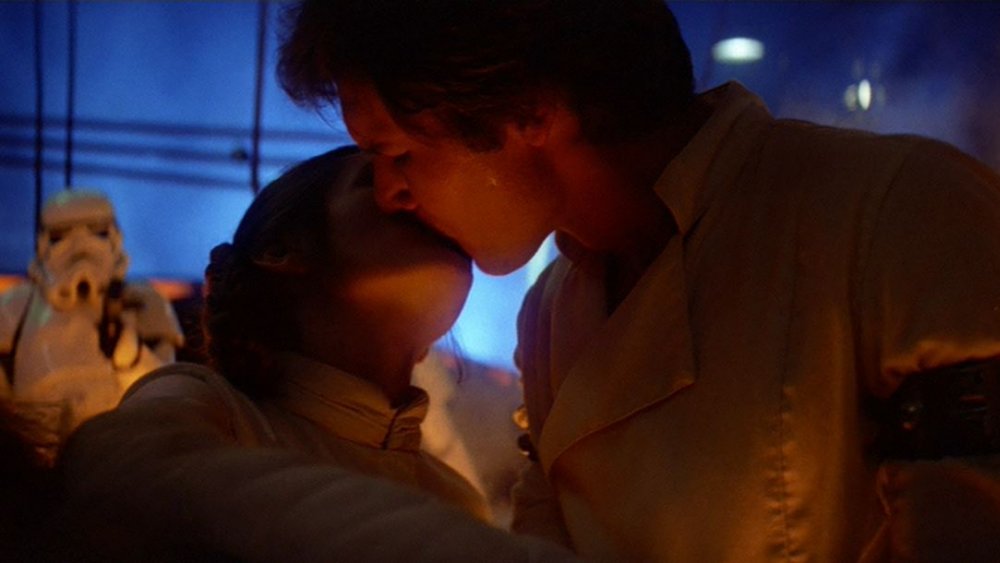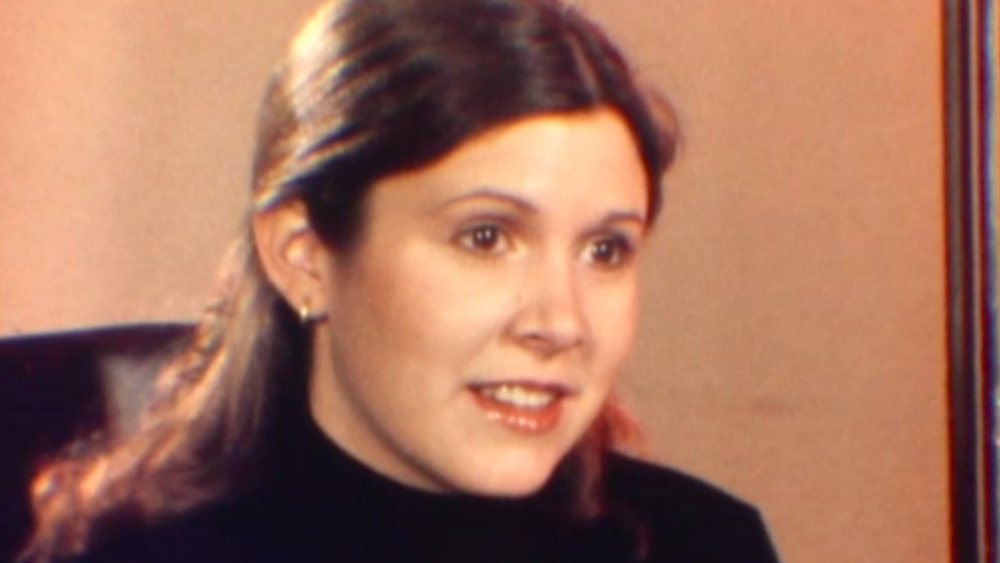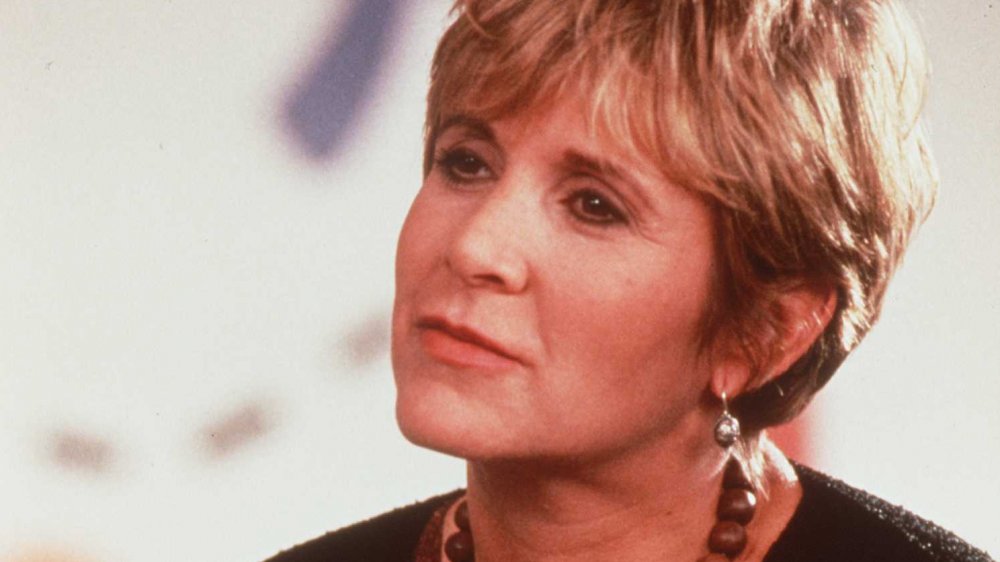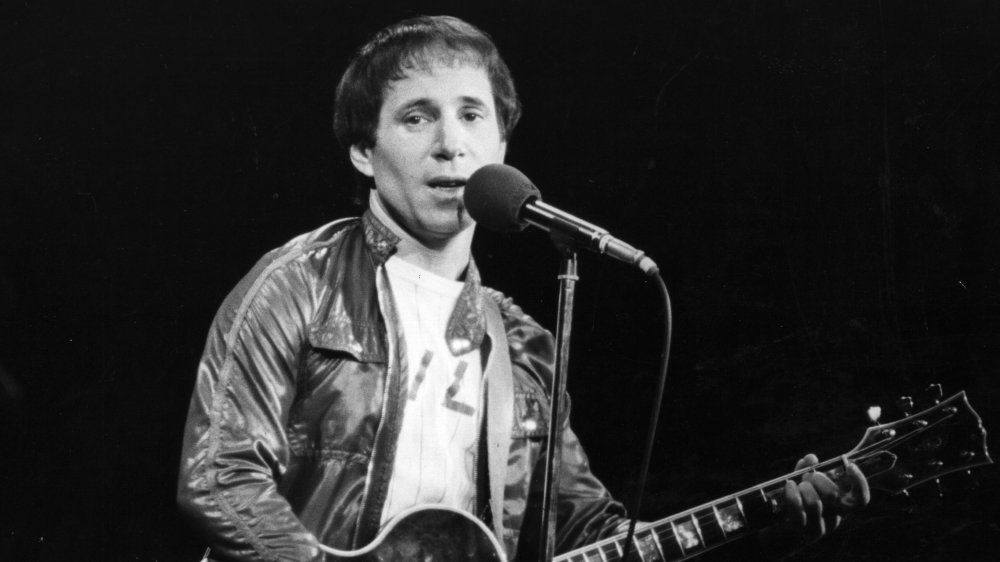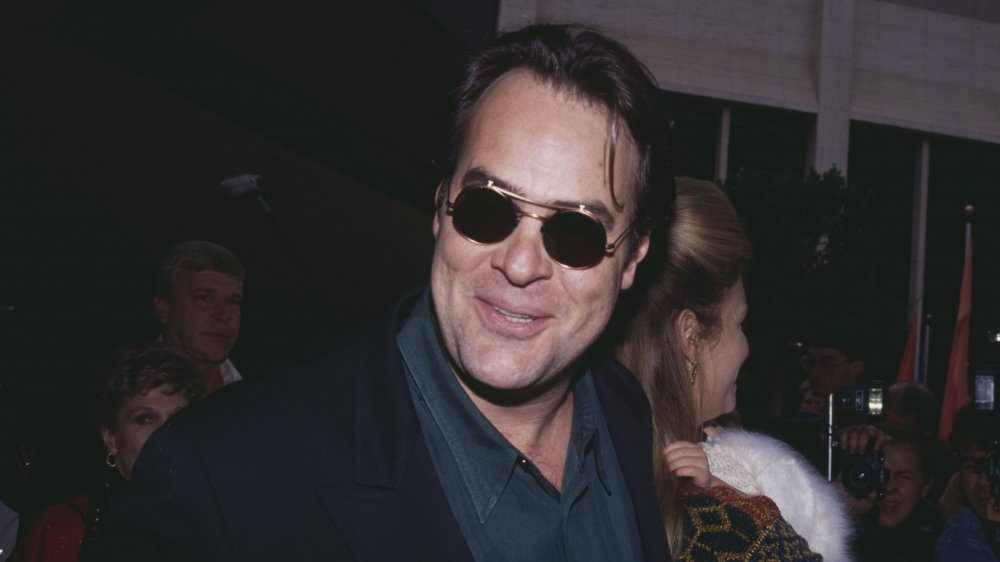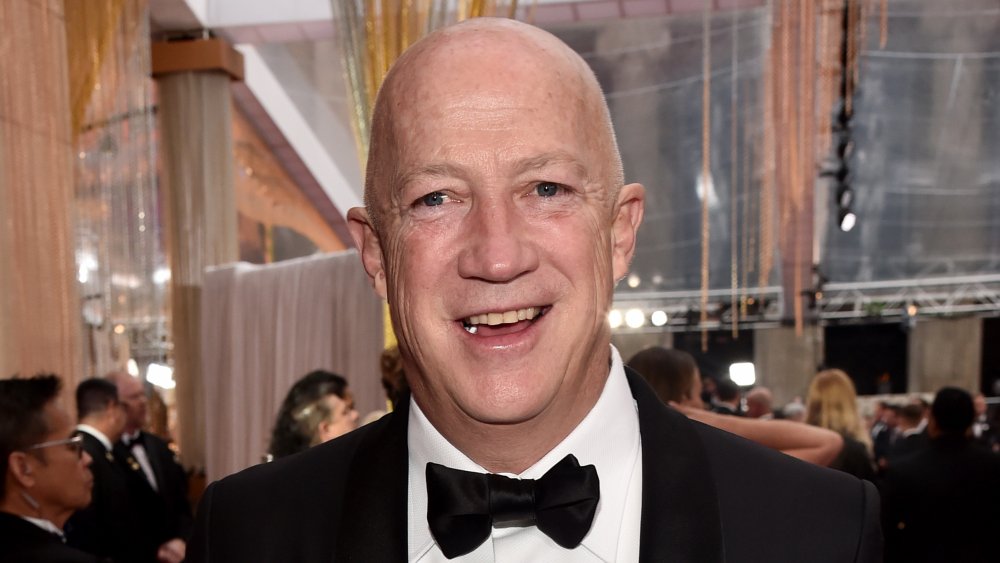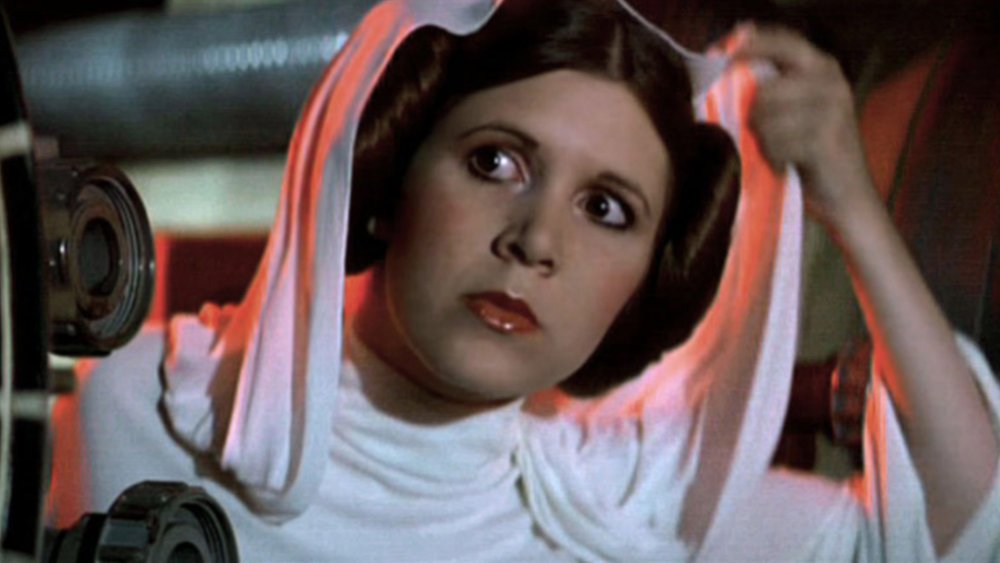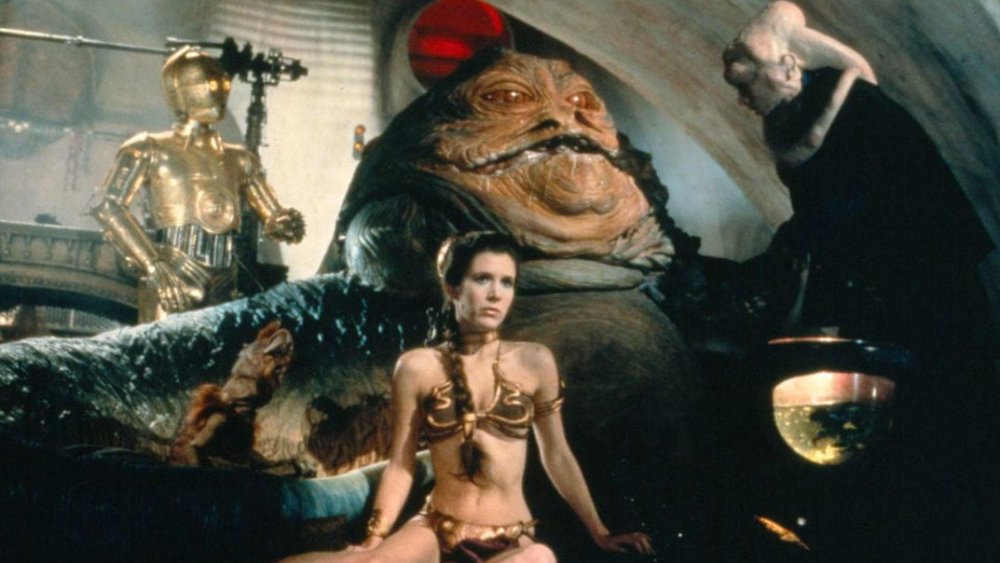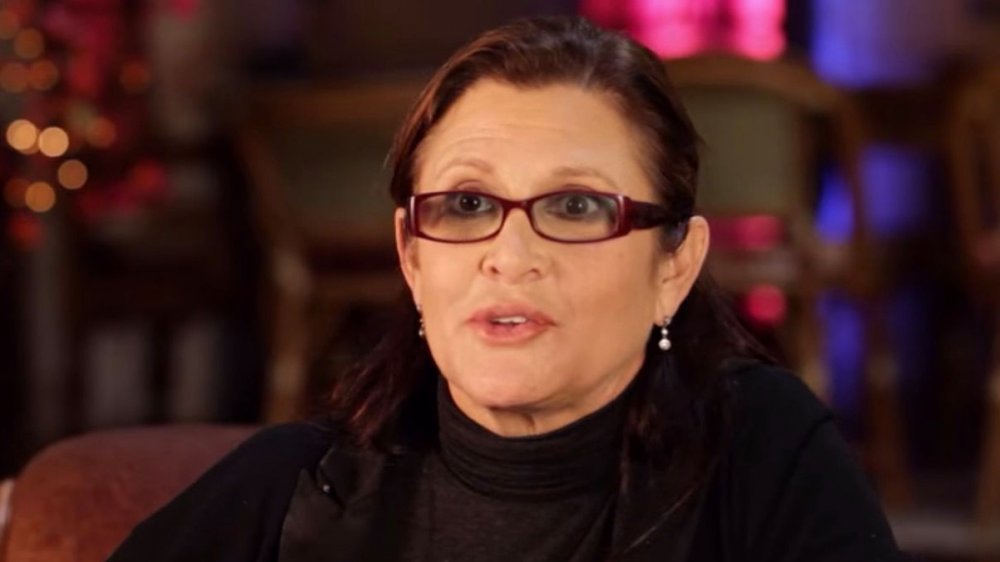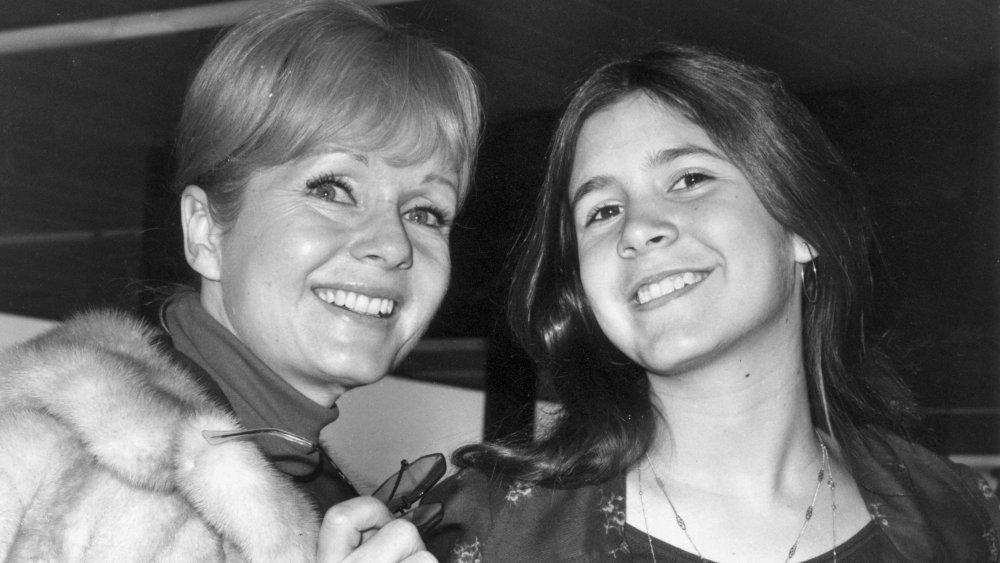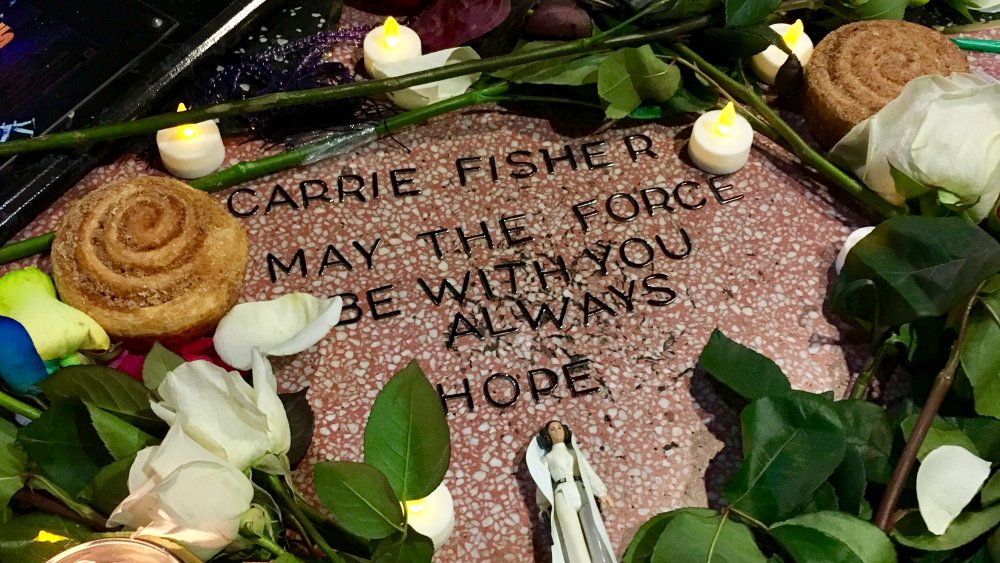The Tragic Real-Life Story Of Carrie Fisher
We may receive a commission on purchases made from links.
Carrie Fisher would probably be the first to protest that her life was far from tragic. She was, after all, born to two of the most famous people in America, grew up in beautiful houses around Los Angeles, and became a movie star off the back of the second film she ever appeared in. Multiple generations of people grew up idolizing her as feisty Princess Leia, giving her job security in one of the highest-grossing franchises. She was also incredibly witty, writing multiple books and working as a script doctor. And she was close to her mother, her brother, and her beloved daughter, who even chose to follow in her acting footsteps.
However, Fisher would probably also be the first to tell you that she did go through struggles, notably mental illness and addictions to drugs and alcohol. But that's because she believed that being honest about problems helps other people overcome theirs. This is the tragic real-life story of Carrie Fisher.
Carrie Fisher's parents had one of Hollywood's most infamous divorces
Carrie Fisher was famous before she was even born. Her parents Eddie Fisher and Debbie Reynolds were a super famous singer and super famous actress, respectively, who were christened "America's sweethearts." Carrie joked in her first of three autobiographies, Wishful Drinking, that when she was born, the doctors ignored her because they were too busy fawning over her parents.
But in 1958, when Carrie was two, the golden couple rocked America when Eddie left Reynolds for Elizabeth Taylor. Taylor and Reynolds had been friends since they were teenagers in Hollywood, and Eddie was the best man at Taylor's 1957 wedding to his friend Mike Todd. When Todd died in a plane crash, the grieving Taylor and Fisher started an affair. Soon, Eddie Fisher divorced Debbie Reynolds. He and Taylor married just over a year after Todd's death, in May 1959, and divorced nearly five years later, according to ABC.
Carrie Fisher and her younger brother Todd — named after Taylor's husband before his death — lived with Debbie Reynolds. They had a glamorous childhood among LA's A-list, including Judy Garland, Jimmy Stewart, and Cary Grant, according to Todd Fisher's autobiography. Carrie Fisher later wrote that they missed spending time with Reynolds, who loved being with her children but also worked a lot.
Carrie Fisher had an affair with Harrison Ford
The chemistry between Princess Leia and Han Solo radiated from the screen throughout the original Star Wars trilogy. And behind the scenes, the actors playing the rebel leader and the scruffy-looking nerf herder went method with the relationship.
In her 2016 memoir The Princess Diarist, Carrie Fisher revealed that she and then-married Harrison Ford (who of course played Solo) had an affair in 1976 during the filming of the first Star Wars movie. According to Fisher, it kicked off at a birthday party for director George Lucas, when Ford rescued her from a group of crew members who had got 19-year-old Fisher drunk. Ford — who was 33 — bundled Fisher into a taxi, they made out, and started an affair that lasted for the rest of the shoot.
Fisher also admitted in the book that she'd wanted to have an affair because she felt like it would make her seem like an adult, but that looking back, she was naive and insecure. She developed deeper feelings for Ford, who was, by her account, emotionally aloof.
In an interview with GQ after Fisher's death, Ford confirmed that he was pre-warned about the book but never read it. Fisher told the Guardian, "This is the most personal thing I have written," and her brother Todd Fisher wrote in his memoir that his sister later admitted that she regretted telling the story of the affair.
Carrie Fisher was diagnosed with bipolar disorder at 24
Carrie Fisher was a proud advocate for people with mental health disorders. She was diagnosed with bipolar disorder when she was 24, but she told WebMD that it took her five years to accept the diagnosis.
In her first memoir, 2008's Wishful Drinking, Fisher described bipolar as, "having a mood system that functions essentially like weather ... It's like I'm not properly insulated — so all the bad and the good ways that you ... feel — that pours directly into my system unchecked." She explained to WebMD that her bipolar usually manifested in mania, although depression became more common as she got older, especially agitated depression, which she described as: "I was going much faster than everything else around me ... You feel out of step with the world."
Fisher's characteristic unflinching honesty and humor about her bipolar made her a champion for people who shared her diagnosis. In an advice column for the Guardian published in November 2016 — less than a month before her death — Fisher wrote to a reader asking for advice on coming to terms with mental illness. "We have been given a challenging illness ... Think of it as an opportunity to be heroic ... Move through those feelings and meet me on the other side. As your bipolar sister, I'll be watching."
Carrie Fisher spoke openly about her drug and alcohol abuse
As well as opening up about her bipolar diagnosis, Carrie Fisher was candid about using drugs and alcohol to cope with the emotional ups and downs that came with the disorder.
She wrote about smoking weed from the age of 13 — initially with her mother — in Wishful Drinking. She quit the drug six years later, on the set of Star Wars, writing, "it suddenly became creepy and dark and scary." Instead, on the set of The Empire Strikes Back, "I did blow a couple of times," she told the Daily Beast in 2015, adding, "It was location. Location means everything is permitted." Ultimately, her drug use turned into a full-blown addiction to various substances, including cocaine, hallucinogens, and opiates.
In Wishful Drinking, Fisher explained how drugs temporarily soothed but ultimately exacerbated the impact of her bipolar: "I used to refer to my drug use as putting the monster in the box. I wanted to be less, so I took more." It wasn't until she overdosed in 1985 and went into rehab that she was able to confront both her addictions and her bipolar. Getting off drugs, with the help of Alcoholics Anonymous meetings, initially made her feel "pretty crazy," as she told WebMD, and she occasionally relapsed.
Carrie Fisher had a 12-year on/off romance with Paul Simon
A lifelong celebrity, even Carrie Fisher's meet-cute with her future husband reads like a who's-who. Fisher was introduced to musician Paul Simon by actor Richard Dreyfuss in January 1978. She told the New Yorker that on one early date, they ended up dancing at famous New York nightclub Studio 54. She soon moved into his apartment near Central Park in New York, and they started an intense romance that lasted 12 years, although not consecutively.
Fisher wrote in Wishful Drinking, "Paul and I had the secret handshake of shared sensibility. We understood each other perfectly." Despite their connection, the relationship had its ups, downs, and rows. Simon struggled to cope with Fisher's alternating mania and depression, exacerbated by her drug use. By June 1983 they had split again, although Fisher told PEOPLE, "Maybe we're not good roommates, but I love Paul." Sure enough, they got back together shortly after — and that September, they got married.
The marriage only lasted 11 months: they divorced in 1984. But after a year apart, they started dating again. What finally ended the relationship wasn't the rows or Fisher's erratic behavior. According to Simon biographer Peter Ames Carlin, while traveling in the Amazon, the couple took a powerful hallucinogen, and Fisher had a vision of being pinned down by Simon's brain. They split for good in 1990.
Carrie Fisher got engaged to Dan Aykroyd
During one of her "off" periods with Paul Simon, Carrie Fisher squeezed in another serious romance with another celebrity.
At the end of 1977, 21-year-old Fisher started hanging around with the Saturday Night Live writers and performers, inviting them to her wildly popular parties in her New York apartment. She became good friends with John Belushi, bonding over a shared sense of humor and — more ominously — cocaine. On November 18, 1978, Fisher hosted an SNL episode in which Belushi and Dan Aykroyd played the Blues Brothers, and the following July, she joined the comedians to film the 1980 movie of the same title.
Aykroyd had just split from his girlfriend, and Fisher was fighting with Simon. According to Sheila Weller, Belushi encouraged them to get together. At first it was a fling: Fisher appreciated Aykroyd's sweet nature and he wanted to "save" her. After he literally saved her from choking on a Brussels sprout, the romance got serious. They even got engaged: Aykroyd gave Fisher a sapphire ring. But after filming was completed, the relationship fizzled. As Fisher put it to the Chicago Tribune, "But then I got back together with Paul Simon." After her death, Aykroyd wrote a tribute for Empire magazine, calling Fisher, "one of the most brilliant and hilarious minds of our eon."
Carrie Fisher dated Hollywood agent Bryan Lourd for three years
In 1990 — a week after breaking up with Simon for good, according to Wishful Drinking, Fisher met and started dating Bryan Lourd, a senior agent at Creative Artists Agency (CAA). They were together for three years and had a daughter, Billie Lourd, in 1992. A year later, Lourd left Fisher for a man named Scott — at least that's the name Fisher referenced in her memoir — but the two remained close. Fisher wrote in Wishful Drinking, "Bryan took such good care of me that I thought, 'this guy will make a good father.' And I was right, he made a great father — and he still does."
In October 2016, Lourd married his long-time boyfriend Bruce Bozzi in the Beverly Hills Courthouse. Billie has credited Bryan with providing stability that the mostly wonderful life she had with her mother often lacked. "He gets home at the same time every day, and we eat dinner together, we do homework together ... At Mom's it was like, 'Let's put Christmas lights in the palm trees at 2 am,'" she told Town & Country in 2017.
Carrie Fisher struggled with her legacy as Princess Leia
There aren't many movies that have the kind of cultural impact that Star Wars did. But at 19 years old, Carrie Fisher went from the kind of fame that comes with being the child of two megastars to being a megastar in her own right.
Fisher's brother Todd told Variety, "It took Carrie about decade or two to embrace that she and Princess Leia were one and that her fans were kind of like an extended family." In The Princess Diarist, Fisher wrote about the weirdness of meeting fans who've known who she is their whole lives and talk to her like she's an old friend. She also had to deal with constantly seeing photos of her 19-year-old self — complete with hair buns — that she doesn't remember being taken.
"Sometimes I feel as if I'd rather concern myself with ... almost anything. But as it happens I've spent the lion's share of my life ... being as much myself as Princess Leia ... wishing she'd finally just go away and leave me to be myself alone, but then wondering who I'd be without her," Fisher wrote. Ultimately, she embraced her connection to Leia, telling TimeOut in 2014, "By this age, it would be ridiculous if I had a problem with it."
Carrie Fisher was constantly bullied to lose weight
When Carrie Fisher was cast in Star Wars, the production team asked the already slim actress to lose even more weight. They even sent her to what she called a fat farm. She returned the same size and spent the shoot paranoid about being fired. Fisher later said that she had "serious body dysmorphia issues," in an interview with the Daily Beast. She, Hollywood, and the public would continue to beat her up over her weight for the rest of her life. Her friends often worried that she was too thin: she told the Chicago Tribune that Dan Aykroyd tried to help her eat.
In her memoir Shockaholic, Fisher wrote that the medications she took to help with her bipolar contributed to her gaining weight. In theory, she was fine with this, but in practice, it bothered her. "I've always wished that I was someone who really didn't care what I looked like, but I do," she wrote.
In 2010, she became a spokeswoman for diet program Jenny Craig. But when Disney called her to reprise Leia for The Force Awakens, they also sent a personal trainer. Ever the rebel, the Telegraph reported that she refused to do the exercises, and snuck cans of Coca-Cola — as many as 16 a day, she told The Ellen DeGeneres Show.
Electroconvulsive therapy affected Carrie Fisher's memory
For Carrie Fisher, as for many people, the phrase "electroconvulsive therapy" (ECT) conjured up images of One Flew Over the Cuckoo's Nest — its most notorious depiction. But the treatment has evolved majorly since the 1960s, and for Fisher, it helped her treat a major bout of depression, which had led to a relapse into taking drugs and a temporary separation from her daughter.
In Shockaholic, Fisher wrote that for reasons that will become apparent, she couldn't remember the experience of getting ECT for the first time. But she clarified that treatments now typically include an anesthetic and anticonvulsant before the shocks, which means no thrashing around in agony. She started with three treatments three times a week, then moved to one every six weeks.
"[This] thing punched the dark lights out of my depression. It did for me what drugs had done for me. It was like a mute button muffling the noise of my shrieking feelings," she wrote. The downside was the impact on her short-term memory and even her ability to remember words, and books or movies she'd seen. "Ultimately, though, who gives a s*** why I can't remember what I can't remember when I feel so much better, right?" she added.
Carrie Fisher had an intense relationship with her mother Debbie
After Eddie Fisher left the family to be with Elizabeth Taylor, Carrie and Todd lived with their mother (and, later, a stepfather.) Debbie was a devoted mother, but she worked a lot, which sometimes made Carrie Fisher feel neglected.
Fisher's own sudden fame also tested the relationship. Both she and Reynolds were 19 when they starred in movies that propelled them to instant iconic fame: Reynolds in Singin' in the Rain and Carrie in Star Wars. According to Vanity Fair, Fisher struggled with the idea that she had to share her mother with her fans, and Reynolds struggled to see her daughter's fame overtake her own. Todd Fisher wrote in his memoir My Girls that Carrie thought that Reynolds was always trying to compete with her, but he felt that the competition was mutual.
According to TIME, Reynolds and Carrie didn't speak during Carrie's 20s, but by the end of both of their lives, they were extremely close — and still arguing. In 2010, Reynolds told the New York Times, "Carrie and I have disagreements and stalemates, but we still walk away loving each other." They even lived next door to each other.
Debbie Reynolds died the day after her daughter. Todd Fisher wrote in My Girls, "Debbie Reynolds willed herself right off this planet to personally see to it that Carrie would never be alone."
Billie Lourd blamed drugs and mental illness for her mother's death
Carrie Fisher died on December 27, 2016, four days after she had a heart attack on a flight. Debbie Reynolds died the next day of a stroke. In June 2017, the Guardian reported that the just-released coroner's report stated that the official cause of Fisher's death was sleep apnea, in which air can't get into the lungs during sleep or unconsciousness. In addition, tests showed that Fisher's blood contained traces of cocaine, heroin, morphine, and MDMA, although it wasn't clear whether these had contributed to her death.
Fisher had been open about the fact she had occasionally relapsed into drug use after getting sober. Her daughter Billie Lourd issued a statement to PEOPLE in response, writing, "My mom battled drug addiction and mental illness her entire life. She ultimately died of it." Lourd added that Fisher, "was purposefully open in all of her work about the social stigmas surrounding these diseases," and that, "she'd want her death to encourage people to be open about their struggles."
Billie Lourd is making her own mark in the acting world. Fittingly, Lourd's first acting role was in The Force Awakens, as the Rebel Alliance's Lieutenant Connix. She had a scene-stealing turn as Gigi in Book Smart, minion Sadie Swenson in Scream Queens, and multiple characters in American Horror Story. She told Town & Country that Carrie Fisher supported her in her own unique way: "saying, 'Shut up, you're great in this. Have faith in yourself.'"
